- Home
- Laini Taylor
Blackbringer
Blackbringer Read online
Table of Contents
Title Page
Copyright Page
Dedication
Acknowledgements
ONE
TWO
THREE
FOUR
FIVE
SIX
SEVEN
EIGHT
NINE
TEN
ELEVEN
TWELVE
THIRTEEN
FOURTEEN
FIFTEEN
SIXTEEN
SEVENTEEN
EIGHTEEN
NINETEEN
TWENTY
TWENTY-ONE
TWENTY-TWO
TWENTY-THREE
TWENTY-FOUR
TWENTY-FIVE
TWENTY-SIX
TWENTY-SEVEN
TWENTY-EIGHT
TWENTY-NINE
THIRTY
THIRTY-ONE
THIRTY-TWO
THIRTY-THREE
THIRTY-FOUR
THIRTY-FIVE
THIRTY-SIX
THIRTY-SEVEN
THIRTY-EIGHT
THIRTY-NINE
FORTY
FORTY-ONE
G. P. PUTNAM’S SONS A division of Penguin Young Readers Group.
Published by the Penguin Group. Penguin Group (USA) Inc.,
375 Hudson Street, New York, New York 10014, U.S.A.
Penguin Group (Canada), 90 Eglinton Avenue East, Suite 700, Toronto, Ontario, Canada M4P 2Y3 (a division of Pearson Penguin Canada Inc.). Penguin Books Ltd, 80 Strand, London WC2R 0RL, England. Penguin Ireland, 25 St. Stephen’s Green, Dublin 2, Ireland (a division of Penguin Books Ltd). Penguin Books Australia Ltd, 250 Camberwell Road, Camberwell, Victoria 3124, Australia (a division of Pearson Australia Group Pty Ltd). Penguin Books India Pvt Ltd, 11 Community Centre, Panchsheel Park, New Delhi-110 017, India. Penguin Group (NZ), Cnr Airborne and Rosedale Roads, Albany, Auckland 1310, New Zealand (a division of Pearson New Zealand Ltd). Penguin Books (South Africa) (Pty) Ltd, 24 Sturdee Avenue, Rosebank, Johannesburg 2196, South Africa. Penguin Books Ltd, Registered Offices: 80 Strand, London WC2R 0RL, England.
Copyright © 2007 Laini Taylor.
eISBN : 978-1-101-09951-3
First Impression
http://us.penguingroup.com
In gratitude to my parents
for a childhood of books and journeys,
and to Jim,
for art and gondola rides and more art,
and always,
for love
Acknowledgments
Thanks go out to my helpful readers: Alexandra Saperstein, whose enthusiasm is like magical writing adrenalin; Jim Di Bartolo, my husband, favorite artist, and action scene consultant; Patti Taylor, my mother, who’s just a little too fond of Batch; and Abigail Samoun, whose feedback in the early days was like a map in a labyrinth.
Thanks also to the SCBWI, without which I would never have met my agent, Jane Putch, or my editor, Timothy Travaglini, neither of whom I can ever thank enough for turning my manuscript into a real book. I shall try, on an ongoing basis, to express my gratitude with cookies.
PRELUDE
The wolf tasted the babe’s face with the tip of his tongue and pronounced her sweet, and the fox licked the back of her head to see if it was so. For the rest of her life, when this child grew into a faerie with bright eyes and a laugh as loud and unladylike as a crow’s, that spot on her hair would never lie flat. And though she wouldn’t remember the night the creatures had gathered round to look at her and taste and smell her, she would call those unruly hairs her foxlick, without knowing why.
The branches overhead thrummed with birds. They would wait their turn but they wouldn’t be quiet about it. No matter. The creatures weren’t worried about being interrupted by faeries. The imp had smuggled the babe far from home, floating her down Misky Creek on a linden leaf so that this unusual starlight gathering would draw no unwanted notice. The creatures had her for the night, and by morning she would be back snug in her cradle with no one the wiser.
“Shall we begin?” asked the imp, nuzzling the babe’s pink cheeks with her whiskers and making her laugh. “Who’ll go first?”
They all clamored to go first. Fur brushed against hide, tusks clashed with horns as they pressed nearer, eager and gentle. Most of these creatures would be long dead by the time this babe had grown up and taken her place in the world. But they would give her their blessings in turn and hope they helped her make her way.
There would never be another chance. So much depended on this tiny faerie whom dreams had at last made real.
ONE
“Devils!” screamed the fishermen, pointing at the sky.
Magpie Windwitch didn’t know many human words, but she knew this one, devil, in more than twenty of their languages, though this was the first time she’d been called one herself.
“Foolish mannies!” she scoffed, looking down at them from the sky where she was circling their fishing boat amid a swirl of crows.
“Aieeee!” the humans wailed, dropping to their knees to pray.
Certainly it was strange to see crows this far out over the open ocean, but to call them devils, that was going a bit far. Magpie shook her head and signaled to the crows to turn away. This wasn’t the boat they sought anyway. The boat they sought would be empty, forsaken by its fishermen and left to drift.
The boat they sought had met a real devil.
The crows rose up and the West Wind gathered them again into his arms and surged across the sky. Behind them the fishermen lay slouched and gasping against the rails of their boat, their turbans unwinding in the wind. They were right to fear devils. Magpie had a hunter’s respect for fear: it sharpened the senses. But those fishermen, she didn’t doubt, for all their prayers and worry, wouldn’t hesitate to uncork any strange bottle they fished out of the ocean, just to see what was inside. It happened all the time these days, and the devils were just delighted.
She fixed her eyes fiercely on the sea and scanned its breadth between identical horizons, back and forth. It had been days since her grandfather the West Wind had heard the albatross’s rumor of an abandoned boat adrift at sea. In the time it had taken him to find her and bring her here, it could have drifted anywhere. The sea was a vast hunting ground and she was getting nervous. Though the wind held the crows aloft in his airy arms, they weren’t made for such long flight and would still grow tired in time. They needed to find that boat.
“How you holding up, my feather?” she asked the crow she rode upon, stroking his sleek head with both hands.
“Like a leaf on a breeze,” he answered in his singsong voice. “A champagne bubble. A hovering hawk. A cloud! Nothing to it!”
“So you say. But I’m no tiny sprout anymore, Calypso, and sure you can’t carry me forever.”
“Piff! Ye weigh no more than a dust mouse, so hush yer spathering. ’Twill be a sore day for me when I can’t carry my ’Pie.”
Magpie went back to scanning the sea, her chin resting on Calypso’s head. Ever since she was a tiny thing she’d loved riding him, but as she grew up she did so less and less, generally flying alongside him instead. Her own dragonfly wings were sleek as blades, many-paned like stained glass and as swift as any wings under the sun or moon. But she was tired, still drained from a two-day chase in the desert. That scarab devil had given her a time, to be sure, so she hadn’t put up a fuss when Calypso insisted on carrying her.
As far as her keen eyes could tell, the surface of the sea spread out empty all around them. They flew on, deeper into the vastness of it.
An hour passed before at last Magpie spotted a listing, slack-sailed boat. The crows circled, heaving and panting, and dropped out of the arms of the wind to go in for a closer look. Magpie stood up on Calypso
’s back. She took one step into thin air and plummeted some thirty feet straight down before flicking her wings open like a fan and coming in for a sharp landing on the boat’s rail. She crouched, paused, then prowled forward like a creature, ready to spring into the air if surprised.
The boat seemed empty. Magpie waved and all seven crows came in to land. Seeing nothing amiss on deck, they cautiously descended into the fishing boat’s small cabin. There they found signs of recent human habitation: tobacco, dirty tin cups, a backgammon board open on the table. On the same table Magpie found just what she was looking for and had hoped not to find. She had hoped this would turn out to be some human mystery of no interest to herself or any of her kind. But that was not the case.
Lying on its side on the table was a tarnished silver flask with a long neck and elegant scrolled handle. Its wax seal had been broken and lay in two pieces beside it. She and Calypso exchanged a somber look.
“Might just be a coffeepot,” the crow offered hopefully. He had a chip in the left side of his beak that made him seem perpetually to grin.
Magpie’s eyes swept over the table and settled on the two halves of the seal. She took it up in her hands and her face paled. “It’s no coffeepot,” she said.
“What is it, ’Pie?” Calypso asked, hopping toward her. The other crows crowded in, curious.
“What ye got, Mags? Eh, Mags?” asked the smallest one, Pup, in a quiver of spasmodic energy.
Magpie held the pieces together. Emblazoned in the wax was a hand in the center of a flame. “It’s the Magruwen’s seal,” she said in a hushed voice.
“The Magruwen?” they all squawked, puffing up their feathers.
“The Djinn King?” gasped Pup’s brother, Pigeon.
“B-but . . . ,” Calypso stammered, “I never heard of him trifling with devils!”
“Nor I.” Magpie was solemn, looking around the small cabin. Aside from the seal, there was no evidence a devil had even been here. The odor was usually overwhelming when a devil had freshly been freed from thousands of years stewing in its own stench, but she smelled nothing. She sat back on her heels.
She’d caught quite a few devils since she got started hunting them eight years ago. The scarab devil had made twenty-three, which was, as far as she knew, twenty-three more than any other living faerie had caught. That was twenty-three ancient bottles fished up by humans and twenty-three broken seals. None of those had borne the sigil of the Magruwen. Magpie knew the legends of the devil wars better than anyone, and in none of them did the great Djinn King himself stoop to wrestling snags into their prisons. That had always been the work of his champion, Bellatrix, the greatest faerie of all legend, and the champions of the other six Djinn.
“What grim beast could need so strong a seal?” Calypso whispered, peering around the cabin. “Think it’s still aboard?”
“Neh,” Magpie said. “It’s gone.” She felt no devilish presence. In fact, but for the missing fishermen there seemed nothing at all wrong. She had seen the aftermath of plenty of devil escapes and they all had two things in common: blood and stench. Here were neither of those and yet a shiver gripped her spine. For here was something she had never expected to see: the Magruwen’s seal upon a snag’s prison. It shivered her to think what could have been inside it.
Something on the floor caught her eye and she leapt down to it. “Flummox me . . . ,” she said. The crows swooped down too.
Four pairs of battered canvas shoes were arranged around the table with their toes pointed inward, as if the fishermen had gathered here to open the bottle they’d pulled up in their nets. Whatever had been inside, it had been there for a long, long time, and it had come out hungry. Calypso whistled low. “Snatched ’em right out of their slippers,” he said.
“Why’d they let it out?” Pup wanted to know. “Why do they always?”
“I reckon they heard the story about the wishes,” replied Swig.
Magpie sighed. One devil, just one in all of devil history, had granted three wishes to the human who freed it. Magpie had caught that troublemaking snag five years ago and put him back, but the damage was already done. The mannies had a mania for it now, and every chance they got they freed some wicked thing back into the world, and they surely didn’t get wishes for their trouble.
What had these fools gotten? Just their shoes left behind, and no one to spread that story. “Poor dumb mannies,” she muttered.
“Curiosity killed the eejit,” Calypso replied with a shrug.
Magpie frowned at him. Usually pity was the last emotion humans inspired in her, but something about those empty shoes tugged at her heart. She reached toward the frayed fabric of the nearest slipper, forming pictures in her mind as she did so. Glyphs—symbols drawn in one’s thoughts—were the basic element of faerie magic. The simplest were mere shapes that every sprout mastered with learning to read. Making light and fire, floating, hiding, protection from trespass, basic healing, and housework; these things were as easy as the alphabet. Real magic came with more complex glyphs and fusing multiple glyphs together in precise ways, being able to conjure them from memory and “vision” them, hold them burning in one’s mind with perfect concentration.
The glyphs Magpie visioned now were for “memory” and “touch,” and no sooner had she laid her fingers on the human’s slipper than a jolt surged up her arm and she was engulfed in darkness. It went as soon as she jerked her hand away, but the shock drove her to her knees and she gasped.
“ ’Pie!” squawked Calypso. “ ’Pie, darlin’, what is it?”
Her fingers were still tingling from the jolt. She said, “Darkness.”
“Eh? That all?”
The mannies’ last memory, seared into the last thing they’d touched, was of darkness. This spell for memory touch, learned from faeries in the high Sayash Mountains, had become a valuable snag-hunting tool, more than once showing Magpie the face of the devil she was seeking as glimpsed in its victims’ last moments. But these mannies had seen only darkness. Or had there been something else?
She hesitated and touched the shoe again. This time, braced for it, she didn’t let it knock her to her knees, but she couldn’t stop the gasp it forced from her lips. She drew her hand hastily away and said, “Hunger.”
“Hunger?”
“Aye. Mad hunger.” She shivered and with one last quick look around said, “Let’s go,” and they flew back up on deck, several crows lugging the devil’s bottle between them. “Rest awhile,” she told them. “It’s a long sky till landfall and I don’t want to feed any crows to the sea.”
Calypso stretched his wings and yawned. “Just a catnap, then. Wake us when it’s time to go, ’Pie.” He tucked his head against his breast and closed his eyes.
Magpie stretched too and looked around. Her grandfather had conjured his faerie skin and was waiting for her in the midst of a clump of napping crows, looking just like a jolly old codger with whiskers, broad-chested and lively. Elementals like the winds or the Djinn could put on skins and enjoy a taste of mortal life, which was how Magpie came to have the West Wind for a grandfather. Six hundred years ago he’d taken one look at a lovely lass named Sparrow, fallen head over heels for her, and gone to craft himself a faerie skin handsome enough to woo her in.
Sparrow had fallen in love back and he’d swept her off to a life in the sky, to travel always cuddled to his chest as he soared above the world. It was a bold, wild life for a faerie—most never even left their forests—but she was a bold, wild lass, and so were her daughter and granddaughter after her, and their place in the world was everywhere and nowhere, like gypsies on wing. No home had they but their caravans and campfires, and no family but the one they’d cobbled together of crows, creatures, and kindred souls they’d met on their endless journey round and round the world.
“Ach, Grandpa, it’s what you thought,” Magpie said, plopping down next to him and resting her glossy head on his shoulder.
“Jacksmoke!” the old fellow cursed, cradling her
to his side and absently smoothing down the foxlick that stood up like a tuft from the top of her wind-whipped head. “Another loose devil? Skiving plague of meddlesome mannies, can’t leave a bottle well enough alone!”
“Aye, that’s six in as many months. They keep on like this, the world’ll be crawling with snags like it was before the devil wars! I can’t keep up, all on my own.”
“Maybe you shouldn’t try, love. Leave ’em free! There are too many mannies anyway, neh?”
“Ach, and what of everyone else? It wasn’t mannies that scarab devil killed but faeries!”
“And what of this one? Got away?”
“Aye.” She scowled. “And Grandpa, there’s something mad strange about this one. . . . Its bottle, it was sealed by the Magruwen.”
“Eh? Impossible!” he declared. “That old scorch never dirtied his hands on devils.”
“You never heard of anything, then, during the wars? Some lost story?”
“Neh, and sure I’d remember, no matter it was twenty-five thousand years ago. I remember Bellatrix clear as yesterday. What a sight she was in battle! ’Twas she and the other champions who caught all the snags.”
“Aye, I always thought so, but what of this seal?”
He took it and examined it, frowning. “Jacksmoke. It’s his, all right. Ancient and true.” He handed it back. “No idea what was in the bottle?”
“Neh, none. There’s no smell, no drool, no blood. Nothing at all.”
“And what of the fishermen?”
“Ate them, I reckon.”
“Ate them? I thought you said there was no blood.”
“Nary a drop,” Magpie admitted.
“Ach, there would be! You ever know a devil to chew with its mouth closed?”
“Neh . . . ,” she said. But she could still feel that hunger tugging at her through the manny’s left-behind memory. “If it didn’t eat them, what did it do to them?”
He shrugged. “Could be they launched a skiff and got away.”

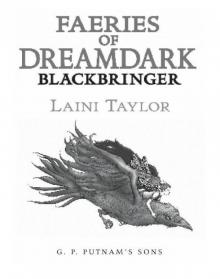 Blackbringer
Blackbringer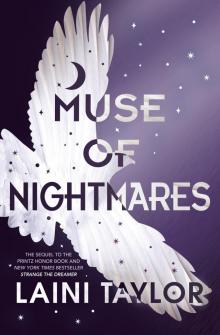 Muse of Nightmares
Muse of Nightmares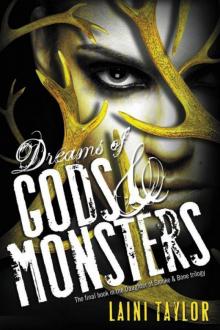 Dreams of Gods & Monsters
Dreams of Gods & Monsters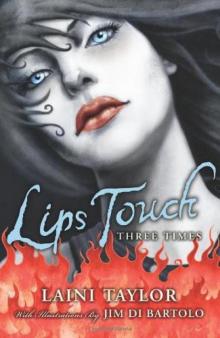 Lips Touch: Three Times
Lips Touch: Three Times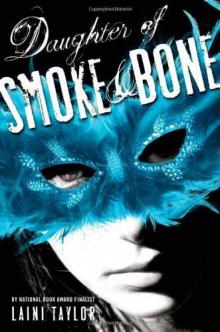 Daughter of Smoke & Bone
Daughter of Smoke & Bone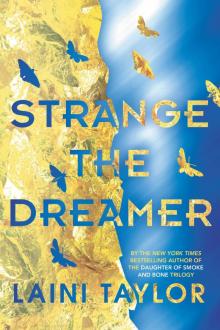 Strange the Dreamer
Strange the Dreamer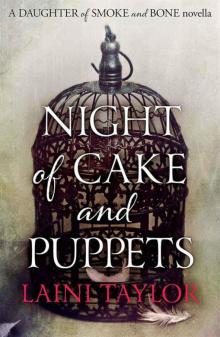 Night of Cake & Puppets
Night of Cake & Puppets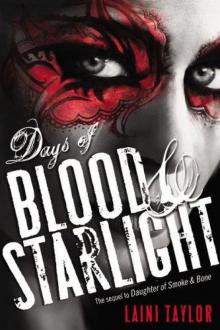 Days of Blood & Starlight
Days of Blood & Starlight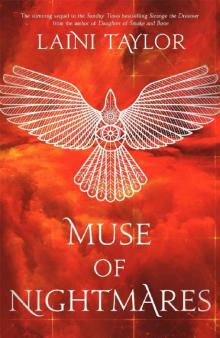 Muse of Nightmares (Strange the Dreamer #2_UK)
Muse of Nightmares (Strange the Dreamer #2_UK) Daughter of Smoke and Bone dosab-1
Daughter of Smoke and Bone dosab-1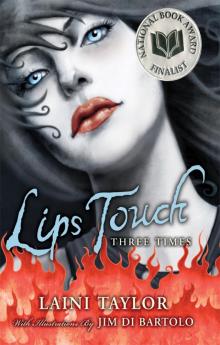 Three Times
Three Times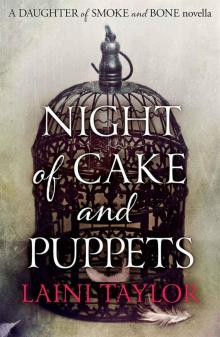 Night of Cake and Puppets (a Daughter of Smoke and Bone novella)
Night of Cake and Puppets (a Daughter of Smoke and Bone novella)